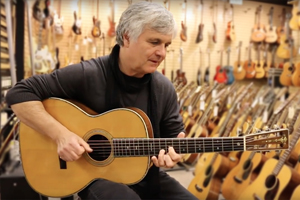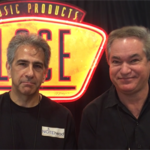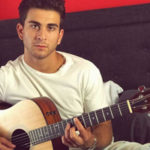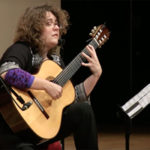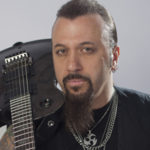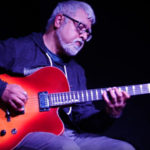The last guitarist in Wings is known for more than just working with a Beatle
By Gary Graff
March 28, 2018
Laurence Juber’s calling card to notoriety is the distinction of being the final lead guitarist in Paul McCartney’s Wings, where Juber served from 1978-81, playing on the album Back To The Egg. But rest assured there’s much more to him than that. The British-born musician, who started playing guitar the week the Beatles’ “I Want To Hold Your Hand” came out, was a jazz virtuoso and studio hand before — not to mention an alumnus of Britain’s National Youth Jazz Orchestra in England — before joining Wings, with voluminous credit up to and including the theme for the 1977 James Bond film The Spy Who Loved Me. Juber started a solo career after Wings disbanded and also went back to the session world, this time in Los Angeles where he amassed credits playing for musicians, movies, TV shows (including Happy Days, Family Ties, Home Improvement and the new and revived Roseanne) and video games. Juber is also involved in education, working on educational endeavors as a consultant to the Los Angeles public school district, and most recently he released a digital version of Standard Time, a set of pop standards — plus the unreleased “Maisie” with McCartney on bass — that Juber released as a vinyl EP back in 1982 and has been out of print since.
FGPO: How did you start playing guitar?
Juber: In the early ‘60s, guitar was very much on the airwaves. The Shadows were very big in England, not only as Cliff Richards’ backing group but also as an instrumental band, the same kind of genre as the Ventures — except we didn’t have any surf for surf music — but that twangy guitar sound was very appealing. It was like: “Wow, there’s all this cool guitar stuff going on.” For my 11th birthday, November of ’63, I got a guitar and never put it down.
FGPO: Who were the other key influences for you?
Juber: Well, I had a cousin play me Buddy Holly records and Elvis Presley records. Around that same time, the first James Bond movie, Dr. No, came out with that James Bond theme, and that sound became an earworm for me. Then of course in 1963, on the English side of the pond you have Beatlemania starting to develop, and at the same time coming from America is this cool folk picking stuff like Bob Dylan, Joan Baez, all the protest songs of that era. And I just ate it all up.
FGPO: Were you a prodigy, then?
Juber: Perhaps. A couple of years after I start playing, a local band leader took me out, playing weddings and stuff like that. It was like: “Hey, I can make money doing this!” And then I discovered the brass ring was to be a studio musician, so that’s what I set my sights on. But even though I had the opportunity as a teenager to leave school and go off and play in rock bands and stuff, I figured I owed it to my parents to get an education. So I was playing in Top 40 bands, doing all kinds of musical activities as a teenager.
FGPO: Was there any desire to study music formally?
Juber: Well, after I got my A level exam results, I did really well in music — “Oh well, maybe this can get me into university to study music.” But I wasn’t interested in going into the conservatory environment and studying classical guitar. I’d been taking classical guitar lessons but was mostly teaching myself. My musical education was mostly self-directed and eclectic. You didn’t go to a teacher to learn to play like Eric Clapton; you just slowed down the Bluesbreakers album and learned to play all the licks. That was my version of what you now do on YouTube. I did get into London University and studied music there. But the summer before my senior year, I was playing in the pit band of a musical on the West End in London, and after that I would go sub in Jesus Christ Superstar for a week, just getting that kind of experience because I could sight-read and had that kind of versatility. At the end of the day, that was what allowed me to have a career.
FGPO: It seems like it came easy for you?
Juber: Understanding seemed to come easily. I never considered myself to be a great technician; for classical purposes, I had to sit and study and play all the Segovia scales and stuff like that. But technique for me was always a means to an end. I was always more fascinated by the texture of music. I would listen to Radio Luxembourg, which is how we could hear all the Top 40 American stuff in England, ’cause the BBC didn’t play everything. But Radio Luxembourg, late at night you’d hear Motown Records and just listen to what the drums were doing and what the bass was doing and kind of deconstruct it all. I didn’t really understand the full value of that until many years later, when I had arranging skills and knew how it was all put together. But the vision for me was to make a living as a professional guitar player. That was really what drove it — and to a large extent still does.
FGPO: How did you get the Wings gig?
Juber: I worked with Denny Laine on a TV show for David Essex. When Paul was asking about me, the No. 1 question he had was: “Is he versatile?” because my predecessor [Jimmy McCulloch] was a fabulous rock player who didn’t cover all the other stuff. I think Paul wanted the range, which I could supply. I fit the suit, as it were.
FGPO: So what was it like?
Juber: It was a great education. I look at it as my studies at McCartney University. I learned what it meant to be an artist in terms of mechanics of the record business and all the things that went along with the release and how it all got put together. With the session playing, you play your part and then you leave — you don’t then go do photos and get interviewed for guitar magazines and all the stuff that goes along with that.
FGPO: Playing in the big leagues, in other words…
Juber: Absolutely. And then there was the whole process of making records, being in the studio not in front of music stands, and not on the band side of the glass but in the control room watching these great engineers do their thing and looking at the way things were miked up. Just the whole process of that was an education in and of itself. And of course the business side, learning where the values are of the music business — just the value of copyrights and publishing and all that kind of stuff. It was a good advanced education there. It was really the burnishing of my resume, having that opportunity to actually work in a famous environment like that, in a rock band with a Beatle and then subsequently play with Paul and Ringo [Starr] together and later with George. It’s really all part of the education.
FGPO: Was it possible to have a favorite moment in Wings?
Juber: One of the most memorable was when we did the Rockestra sessions at Abbey Road in October of ’78. Paul decided he wanted to do a rock ‘n’ roll orchestra, so the guitar section was me, Hank Marvin of the Shadows, David Gilmour, Pete Townshend, Denny Laine. Jimmy Page was supposed to show up; his gear did, but he didn’t. There were three drummers, three bass players. It was crazy, just amazing sessions. Everybody checked their egos at the door and knuckled down and played like an orchestra.
FGPO: The material on Standard Time — stuff like “Stormy Weather,” “Dinah,” “Autumn Leaves,” “The Christmas Song” — must have seemed like a shock coming from Wings’ guitarist back in 1982, but that material was totally in your wheelhouse, wasn’t it?
Juber: It really is, other than the one track [“Maisie”] that has my fellow Wing men on it, was more reflective of the kind of world I worked in as a studio musician before I joined the band. I liked that kind of sound. So it was a challenge to create a trumpet section, a sax section and do all the solos, in a guitaristic way. Paul owned these copyrights, so the idea was to have some really cool recordings that would be available in the music library, but with the capability of releasing it as a full album. I just didn’t realize it was going to take the better part of 40 years! It kind of went off my radar for a while, but when I did my book Guitar With Wings three years ago I was able to get hold of the masters from McCartney’s company for a bonus CD with the special edition. Revisiting it, it actually silly sounds fresh even if stylistically there are some kind of ‘70s-era touchstones. And it’s such an eclectic collection; I had no idea what category to put it in. But that’s OK; I like doing stuff that isn’t easily categorized.
FGPO: How did “Maisie” come to be?
Juber: I was not a composer; my ambition was always to be a session player. But when we were up in Scotland at Paul’s farm working on the first Back To The Egg sessions, I had been sitting outside and started writing this Chet Atkins-style piece, kind of finger-picking, maybe a little bit of Ry Cooder, ’cause I’d been listening to a lot of him at the time. A couple days later Paul said: “Hey, do you have any tunes,” so we recorded [‘Maisie’]. Of course it wasn’t really the kind of thing Back To The Egg was oriented towards, so it didn’t make the cut. But I’ve always been proud of that particular piece of music, and it’s very cool to have Paul McCartney playing bass and Denny Laine playing some harmonica and Steve Holley on drums.
FGPO: You continue to do sessions and record, but you also spend time working with public school music education in Los Angeles. What led to that?
Juber: Part of it is just wanting to pay it forward; guitar has been good to me, so I’ve been developing some material with the Los Angeles school district and some curriculum to bridge the gap between the classical side and the rock side with middle school kids. My mission is to create material that will help guitar players really understand music and music history. I call it guitarology, because the role of guitar in music history is not well understood. Guitar is barely a footnote in classical music history books even though it had a much greater impact, musically, than it’s given credit for, especially in the early 19th century. It’s that aspect of it that’s appealing and interesting to me. That’s an important thing for me, to be able to communicate that type of information.
